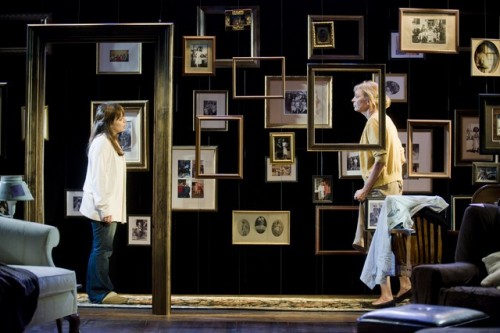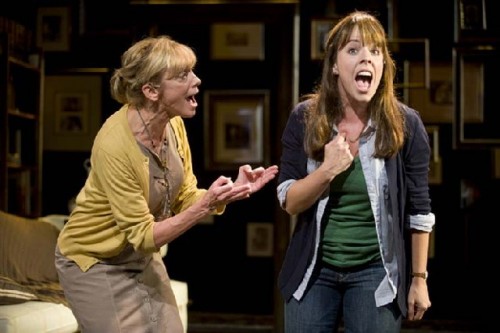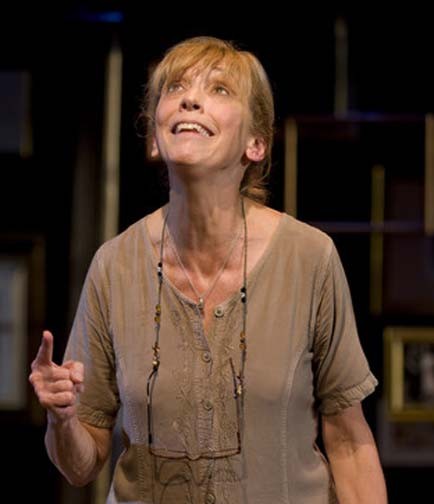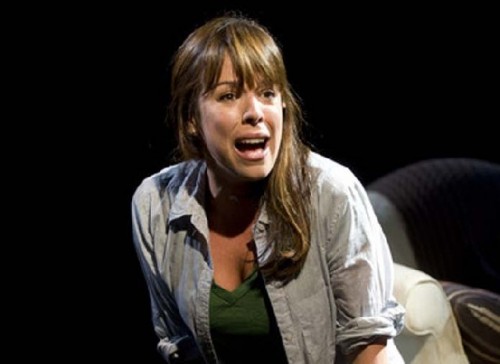The Memory Show at Barrington Stage Company
Alzheimer’s: The Musical
By: Charles Giuliano - Aug 23, 2010
The Memory Show
Book and Lyrics by Sara Cooper; Music by Zach Redler
Directed by Joe Calarco
Scenic Designer, Brian Prather; Costume Designer, Kristina Sneshkoff; Lighting Designer, Joel Shier; Sound Designer, Adair Mallory; Director of Productuion, Tristan Wilson; Press Director, Charlie Suedenburg; Production Stage Manager, Michael Andrew Rodgers; Casting, Pat McCrkle, CSA; Musical Director, Vadim Feichtner; Musical Theatre Lab Artictis Producer, William Finn.
Cast: Catherine Cox (Mother), Leslie Kritzer (Daughter).
Barrington Stage Company
Stage 2
August 18-29
Responses to the new musical, The Memory Show, by the emerging team of Sara Cooper and Zach Redler, will largely hinge on what personal experiences members of the audience bring to the performance.
The 70 minute, one act play on Stage 2 of Barrington Stage Company, focuses on a Mother (Catherine Cox) who is going through the terminal stages of Alzheimer’s Disease, and her Daughter (Leslie Kritzer) who has made the difficult decision to move in and care for her. The alternative, which a doctor advises, is to admit her to a nursing home.
What family has not faced such grim alternatives? To provide care for a declining and every more dependant parent, or condemn loved ones to their last days in unfamiliar, clinical surroundings. The young playwrights are drawing from their own experiences. In that manner the musical is wise beyond their years.
This mother and daughter combination has never been close. The Daughter adored her father Ira who is now deceased. Although they lived in Brooklyn he was buried in far off New Jersey to be next to his mother. The Mother spews out hate for her former husband calling him a bastard. They survived a loveless marriage. As the only man she has ever known since twenty the Mother is frustrated and bitter. It took three years after his death for the daughter to entice her to visit the grave and its headstone.
She has a reason, New Jersey, “It smells.” In addition to being so far away. She even resents the rabbi, a stranger, who said such kind and untrue things about him during services.
Playing the Jewish Mother card the playwrights are able to exploit its clichés. Particularly the mixed emotions between Mother and Daughter. She has given up her apartment and moved in to care for her. The Mother responds that her Daughter just can’t pay the rent. When the Daughter protests that she has made sacrifices to care for her the Mother responds that she gave up the first twenty years of her life to provide a home for her. The Daughter shoots back “You were my mother. It was our job.”
There is even the familiar refrain of torment about why the Daughter is not married. The Jewish Mother twist, “You must be a lesbian.” And an accusation that she has never had a boyfriend.
What this dialogue reveals is that although Mother and Daughter they hardly know each other. The trump card is that the Mother had a big secret. Whenever it is played the Daughter counters that she has heard it all before. Until near the end of the play when the terrible truth about her beloved father tumbles out in a screed.
This is a difficult evening of theatre. Those who have struggled with Alzheimer’s, or have a Jewish mother, may well be devastated. As was a woman seated in front of us who was weeping by the end of the play. We are of an age where many of our friends have or are struggling with these issues. Indeed as a senior it makes me wonder about my own final years. It can take a long time to die. With our failed health care system savings are routinely wiped out.
While this theme makes perfect sense as a drama, and indeed that is where the production is most successful, then why turn such demanding material into a musical? Is this a topic that one really wants to hear set to music? It evokes the tradition of Stephen Sondheim and his dark, occasionally gothic musicals. Barrington presented two this summer Sweeney Todd the Demon Barber of Fleet Street and Into the Woods. This new production reveals that they are continuing to think along those lines.
This was not a musical where one went home whistling a happy tune. But even on first hearing some of the songs were rich, evocative, and memorable. Almost all of the effective ones were sung by Kritzer who has a lovely and resourceful voice. She has a way of burying into you with the intensity of the lyrics. They reminded me, well, of Sondheim. Some of them such as “Me and My Mother” “David’s Smile” and “Apple and Tree” might well survive as standards rendered by the best cabaret singers. The absurd “You and Me Toilet” may have legs as a novelty number. I was flat out flabbergasted by it. It is in the musical material that one sees the potential that encouraged the creative team of Barrington Stage to produce a musical by unknowns. This is their first staged production.
The singing of Cox was problematic. Well, basically, she can’t carry a tune or hit her notes. It was agony to hear her struggle through songs. It started with the opening number when she is asked that absurd question by a physician “Who’s the President of the United States?” That informed us to fasten our seat belts as we were destined for a bumpy evening.
A more generous interpretation is that her rough and craggy delivery was a part of the character. When she missed lines and dropped lyrics, particularly at the end of the play, we wondered if it were a glitch or a symptom of memory loss?
In mounting this new work on its project stage Barrington has been generous in its support. The set by Brian Prather creates the sense of a small, claustrophobic Brooklyn apartment. There are many framed photographs evoking memories now lost. They are suspended in such a manner as to provide transparent room dividers. As well as poignant signifiers of the issues being examined.
While the musical accompaniment of pianist Vadim Feichtner was minimal it was also adequate for the intimate space. He played the score compellingly. It encouraged us to focus on the melodies the better to absorb the complex and rich lyrics.
This is a production that will find its audience. Those who emerge from the experience deeply moved will tell their friends. It may well prove to be viral. For others it is perhaps too raw and difficult.
But, isn’t that exactly how audiences respond to much of Sondheim’s more difficult material? We applaud the courage and commitment of Barrington Stage for providing us with such a daunting and potentially enriching option.





